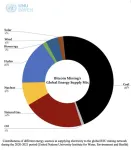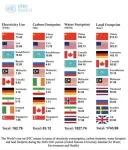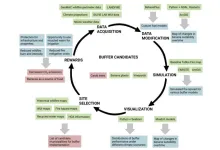Hamilton, Canada: The extraordinary rise in cryptocurrency prices over the previous decade has prompted huge investments in the cryptocurrency sector. Undeniably, digital currencies have won the faith of the world's top investors, ranging from large corporations and tech millionaires to criminals, money launderers, and sanction busters.
Thanks to blockchain and other technological breakthroughs, digital currencies now constitute an advanced element of the world’s modern financial system. They are said to even have the potential to crush the world’s strongest currencies.
The surge in the crypto market is comparable to the gold rush. Yet, this exciting market has a hidden dark side. Mining cryptocurrencies can have major environmental impacts on climate, water, and land, according to new research by United Nations scientists.
Bitcoin is the most renowned and popular cryptocurrency. This motivated the UN scientists to evaluate the environmental impacts of Bitcoin across the world by looking at the activities of 76 Bitcoin mining nations during the 2020–2021 period. The results are shocking. In addition to a substantial carbon footprint, global Bitcoin mining activities have significant water and land footprints.
“Technological innovations are often associated with unintended consequences and Bitcoin is no exception,” said Professor Kaveh Madani, the Director of the United Nations University Institute for Water, Environment and Health (UNU-INWEH), who led this study. “Our findings should not discourage the use of digital currencies. Instead, they should encourage us to invest in regulatory interventions and technological advancements that improve the efficiency of the global financial system without harming the environment.”
According to study results, published by the United Nations University and Earth’s Future journal, during the 2020–2021 period, the global Bitcoin mining network consumed 173.42 Terawatt hours of electricity. This means that if Bitcoin were a country, its energy consumption would have ranked 27th in the world, ahead of a country like Pakistan, with a population of over 230 million people. The resulting carbon footprint was equivalent to that of burning 84 billion pounds of coal or operating 190 natural gas-fired power plants. To offset this footprint, 3.9 billion trees should be planted, covering an area almost equal to the area of the Netherlands, Switzerland, or Denmark or 7% of the Amazon rainforest.
During this time period, Bitcoin's water footprint was similar to the amount of water required to fill over 660,000 Olympic-sized swimming pools, enough to meet the current domestic water needs of more than 300 million people in rural sub-Saharan Africa. The land footprint of worldwide Bitcoin mining activities during this period was 1.4 times the area of Los Angeles.
The UN scientists report that Bitcoin mining heavily relies on fossil energy sources, with coal accounting for 45% of Bitcoin's energy supply mix, followed by natural gas (21%). Hydropower, a renewable energy source with significant water and environmental impacts, is the most important renewable source of energy of the Bitcoin mining network, satisfying 16% of its electricity demand. Nuclear energy has a considerable share of 9% in Bitcoin’s energy supply mix, whereas renewables such as solar and wind only provide 2% and 5% of the total electricity used by Bitcoin.
China, by a large margin, has been the biggest Bitcoin mining nation. To offset the carbon emissions from China's coal-intensive Bitcoin mining operations in 2021–2022, about 2 billion trees should be planted, covering an area equivalent to the sum of Portugal and Ireland or 45,000 times the area of Central Park in New York City. Aside from China, the world’s top 10 Bitcoin mining nations in 2020–2021 included the United States, Kazakhstan, Russia, Malaysia, Canada, Germany, Iran, Ireland, and Singapore.
“Because countries use different sources of energy to generate electricity, their electricity production impacts on climate, water, and land are not the same,” said Dr. Sanaz Chamanara, the lead author of the study and an Environmental, Social and Governance (EGS) Research Fellow at UNU-INWEH. “The rankings of countries in terms of the environmental impacts of their Bitcoin operations change depending on which environmental footprint is considered.”
Norway, Sweden, Thailand, and the United Kingdom are among the countries that make it to the top 10 list when the water or land footprint of their Bitcoin mining activities is taken into account. Together, the top 10 Bitcoin mining countries in terms of environmental footprint are responsible for 92–94% of Bitcoin’s global carbon, water, and land footprints.
The UN scientists make a range of recommendations regarding possible interventions by the governments to monitor and mitigate the environmental impacts of cryptocurrencies. They also suggest investment in other types of digital currencies that are more efficient in terms of energy use and less harmful to the environment. The investigation also calls for attention to the transboundary and transgenerational impacts of mining cryptocurrencies. “When you note which groups are currently benefiting from mining Bitcoin and which nations and generations will suffer the most from its environmental consequences, you can’t stop thinking about the inequity and injustice implications of the unregulated digital currency sector,” said Madani.
Read the paper, summarizing the main findings of the study: Chamanara, S., Ghaffarizadeh, S. A., & Madani, K. (2023). The environmental footprint of Bitcoin mining across the globe: Call for urgent action. Earth's Future, 11, e2023EF003871. https://doi.org/10.1029/2023EF003871.
Read the full report: Chamanara, S. & Madani, K. (2023). The Hidden Environmental Cost of Cryptocurrency: How Bitcoin Mining Impacts Climate, Water and Land, United Nations University Institute for Water, Environment and Health (UNU-INWEH), Hamilton, Ontario, Canada, https://inweh.unu.edu/
Media contacts:
Kyra Bowman, bowman@unu.edu
Maryam Mottalebi, maryam.mottalebi@unu.edu
The UN Team available for interviews:
Prof. Kaveh Madani
Director
United Nations University Institute for Water, Environment & Health
kaveh.madani@unu.edu
Dr. Sanaz Chamanara
Research Fellow, Environmental, Social and Governance (EGS)
United Nations University Institute for Water, Environment & Health
sanaz.chamanara@unu.edu
About United Nations University Institute for Water, Environment and Health (UNU-INWEH)
https://inweh.unu.edu/
The United Nations University Institute for Water, Environment and Health is a member of the United Nations University family of organizations. It is the UN Think Tank on Water created by the UNU Governing Council in 1996. Its mission is to help resolve pressing water challenges of concern to the UN, its Member States and their people, through knowledge-based synthesis of existing bodies of scientific discovery; cutting-edge targeted research that identifies emerging policy issues; application of on-the-ground scalable solutions based on credible research; and relevant and targeted public outreach. UNU-INWEH is hosted by the Government of Canada in Hamilton, Ontario.
END








